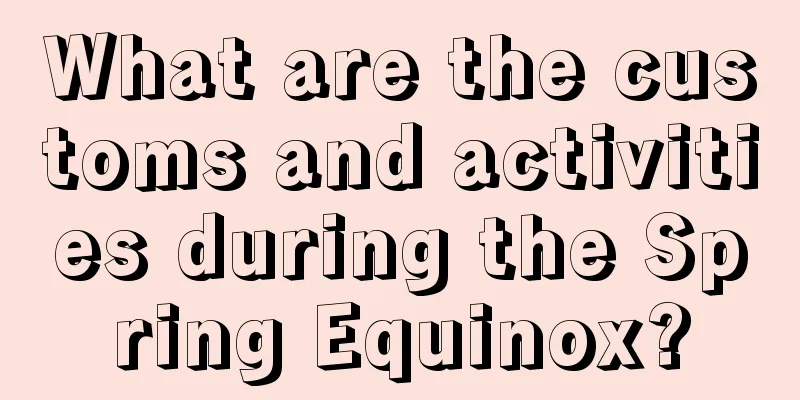What are the customs and activities during the Spring Equinox?

Introduction: In our traditional culture, the Spring Equinox is both a solar term and a festival. The arrival of solar terms reminds people to arrange the rhythm of production and life; the arrival of festivals includes emperors offering sacrifices to their ancestors and people worshipping their ancestors, and there are also other folk activities. What are the customs and activities during the Spring Equinox? Let’s take a look at it together below! Mr. Shui Mo will introduce to you what will happen in February 2017 in the second month of the lunar calendar, because February is the beginning of spring, and the earth begins to wake up and look forward to the arrival of spring.Traditional customs of the Spring EquinoxThe Spring Festival and the Spring Festival are the days for the emperors to celebrate their sacrifices in ancient times. Since the pre-Qin period, the Day of Sacrifice has become the exclusive sacrificial day for the emperor. According to the "Guan Zi", at the end of winter and the beginning of spring every year, the emperor would wear green clothes, a green crown, and go to the altar in the eastern suburbs of Kyoto to offer sacrifices. In the eyes of the ancients, the sun rises in the east and the moon rises in the west. Therefore, people worship the sun in the east and the moon in the west. Before the Ming and Qing dynasties, the emperors had to hold many memorial ceremonies throughout the year; during the Ming and Qing dynasties, the memorial ceremonies were fixed on the day of the Spring Equinox. The sacrificial ceremony was held at the Sun Altar in the capital. Although the memorial ceremonies of the emperors of the Ming and Qing dynasties were not as elaborate as those for offering sacrifices to heaven and earth, they were also quite grand.The emperors hold memorial ceremonies on the Spring Equinox, while the common people worship their ancestors on the Spring Equinox. This custom is popular in Zhejiang, Sichuan, Fujian, Guangdong, Jiangxi and other places, especially in the Hakka communities in the south. Hakka people respect their ancestors and value blood ties. A Hakka proverb says, “Straw sandals on feet, ancestral tablets on back,” which means that even if life is uncertain, one cannot abandon the ancestral tablets. There are two types of ancestor worship among Hakka people: public worship and private worship. Public worship is a clan-wide worship, while private worship is a family worship. There are three kinds of public sacrifices: spring sacrifice, autumn sacrifice and annual festival sacrifice. Among the Hakka people in southern Jiangxi, western Fujian, eastern Guangdong and other areas, spring ancestor worship usually begins on the day of the vernal equinox and lasts until before Qingming Festival. It is believed that after Qingming Festival, the tomb doors will be closed and the ancestors will no longer be able to enjoy the sacrifices of their descendants. The Hakka people's spring sacrifice includes ancestral temple sacrifice and tomb sacrifice: first, sacrifice is held in the ancestral temple, with rituals such as burning incense and candles, setting off firecrackers, placing sacrificial offerings, and reciting sacrificial texts; then they go to the ancestral tombs to sweep the tombs of distant ancestors and the founding ancestor, and then sweep the tombs of the ancestors of each branch and family. After the ancestor worship, the whole family will have a banquet. The spring festivals of some large clans are very grand, with clan members gathering together, sometimes numbering several thousand or even tens of thousands, creating a spectacular scene. In addition to the aforementioned emperor's memorial day and people's ancestor worship activities, there is another sacrificial activity around the spring equinox every year - the Spring Festival. She is the god of land; Chunshe is the festival to worship the god of land, also known as "Spring She Day". In traditional Chinese society, community days are held twice a year, namely Spring Festival and Autumn Festival. In the Spring Festival, people pray for the blessing of the community god and a good harvest; in the Autumn Festival, people report to and thank the community god. There was no fixed date for the Spring Festival in ancient times. Since the Song Dynasty, the fifth day after the beginning of spring has been regarded as the festival day, which is around the vernal equinox. In later generations, the Spring Festival was divided into official and folk festivals: the official festival was a national ceremony held at the Altar of Land and Grain; the folk festival was commonly known as the Birthday of the Land, held in the local temple, and the times were also divided into the second, eighth, twelfth and fifteenth days of the second month. Ancient folk societies had customs such as sacrifices, drinking, competitions, and women stopping sewing. "Jingchu Sui Shi Ji" by Zong Yan of the Southern Dynasties recorded the situation of the Spring Festival in Chu during the Northern and Southern Dynasties: on the day of the Spring Festival, neighbors and relatives gathered together, set up sheds under the trees of the community temple, slaughtered animals to offer sacrifices to the gods, and then enjoyed the sacrificial wine and meat. The custom of Spring Festival sacrifices was also continued by the people in later generations. Food customs, games and other things during the Spring EquinoxIn addition to the Spring Festival and the Spring Festival, there are some other customs on the Spring Equinox in some areas of our country.Eat "spring vegetables" during the Spring Equinox. Spring vegetables can generally refer to seasonal vegetables in spring, but in Kaiping area of Guangdong, spring vegetables specifically refer to a local wild amaranth, commonly known as "Spring Artemisia". On the day of the Spring Equinox, villagers go to the fields to pick spring vegetables. After returning, the spring vegetables and fish fillets were boiled in a soup called "Spring Soup". As the saying goes, "Spring soup cleanses the internal organs and cleanses the liver and intestines. It brings safety and health to the whole family." In some areas in southern my country, there is a custom of eating glutinous rice balls and drinking noodle soup on the Spring Equinox. Not only are glutinous rice balls eaten by people, they are also shared with birds: the cooked glutinous rice balls are impaled with bamboo forks and placed at the edge of fields, which is called "sticking to the bird's mouth." It is said that this can stick the beaks of birds such as sparrows to prevent them from pecking at the rice. In Yangjiang, Guangdong, women go up the mountain to pick flower leaves on the Spring Equinox. They make noodle soup with rice noodles in late spring, which is said to help detoxify. The custom of brewing spring wine during the Spring Equinox is popular in most parts of the country. In Yuqian, Zhejiang, people make wine on the Spring Equinox and store it in jars. After the dog days of summer, the dregs will turn into red wine, and its taste will last for a long time, so it is called "Spring Equinox Wine". In Lingchuan, Shanxi, people not only brew wine on the Spring Equinox, but also offer wine to the God of Agriculture and pray for a good harvest. There are also games and activities such as standing eggs and flying kites on the Spring Equinox. The Spring Equinox Egg Standing Game, also known as the Spring Equinox Egg Standing Game, is a simple folk game: choose a smooth and symmetrical fresh egg, and gently stand it upright on the table. People believe that it is easiest to stand an egg upright on the Spring Equinox. “When the Spring Equinox comes, the eggs will stand up pretty.” In southern my country, women often go out for an outing on the Spring Equinox, which is called "outing"; children compete in flying kites for fun. As the saying goes, "When the willows are green, it's time to fly kites." Farmers in the Jiangnan area feed glutinous rice balls to their oxen on the Spring Equinox as a reward. In Nanling, Anhui, people want to drive away the epidemic on the Spring Equinox. According to the "Nanling County Annals" of the Republic of China, "At dusk on the Spring Equinox, village children competed to beat copper and iron percussion instruments, and the sound could be heard outside the village. The eastern village called it "chasing away the evil spirits", the northern village called it "chasing away the epidemic air", the southern village called it "chasing away the hairy dogs", and the western village called it "chasing away the wild cats." Summary: The above article is an analysis of the customs and activities of the Spring Equinox. You can read it and hope you can feel the charm of life in this spring full of hope! |
<<: What are the precautions for the twelve zodiac signs during the Spring Equinox in 2017?
>>: When is the Spring Equinox in 2017? What do the three phases of the Spring Equinox refer to?
Recommend
Can I get engaged on Women’s Day in 2021? What are the customs and procedures for engagement?
International Women's Day is a festival for wo...
What is the zodiac sign for people born on the New Year’s Eve of December 30th in the lunar calendar in 2020?
What is the zodiac sign for people born on the New...
What are the auspicious and inauspicious things to do on the sixth day of the first lunar month in 2022? Is the sixth day of the first lunar month an auspicious day?
The arrival of the first month of the year marks t...
Is it good for a girl born on the Cold Clothes Festival on October 1, 2019?
Is it good for a girl born on the Cold Clothes Fes...
Check the lunar calendar for March 29th, 2018. Is it a good day?
In March, all things come back to life, willows a...
Is it suitable to move graves on the first day of September in the lunar calendar in 2019? Is today an auspicious day for moving graves?
Introduction: Generally, it is necessary to choose...
Is March 20, Labor Day, 2021 a good day? Can I set up the bed?
The third month of the lunar calendar is the month...
What will happen on October 20th of the lunar calendar in 2021? Where will the God of Happiness be at each hour?
The tenth month of the lunar calendar is coming to...
Is it suitable to pick up the car on August 24th of the lunar calendar in 2021? Is the fortune for today a good one?
The eighth month of the lunar calendar belongs to ...
Is today, March 18th of the lunar calendar 2019, an auspicious day to renovate a house?
Introduction: In our country’s traditional culture...
Can we pay New Year’s greetings on the twelfth day of the lunar year in 2022? How should we say the greetings?
It is the twelfth day of the lunar year, and the y...
Is it possible to hold a funeral on the seventh day of the tenth lunar month in 2021?
Funeral is one of the major events, and the select...
Is it possible to install a door on the twelfth day of the second lunar month in 2022? What details should we pay attention to?
In the second month of the lunar calendar, the wea...
What is the fate of a child born on July 21st of the lunar calendar? Blessed people?
Introduction: Children cannot choose their own tim...
Is it suitable to set up a bed on April 18th of the lunar calendar in 2021? Is this an auspicious day?
In April, the branches are full of locust flowers,...









